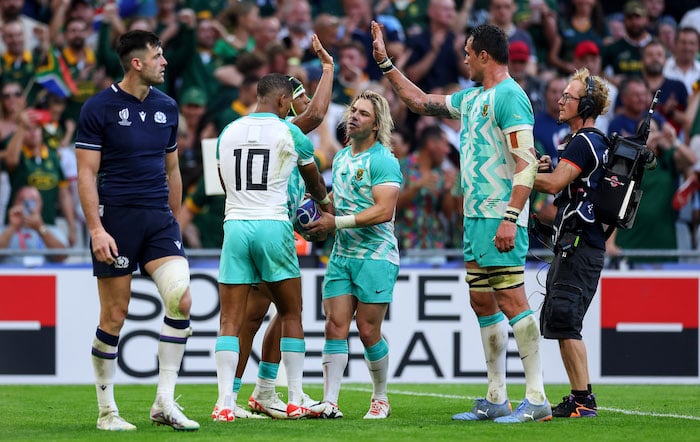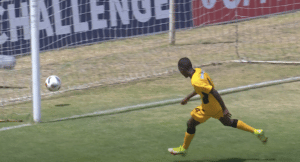The Springboks got their Rugby World Cup title defence off to the perfect start following their 18-3 victory over Scotland in Marseille on Sunday.
The Springboks fielded a team consisting of 14 players from the match-day squad of 23 who emerged victorious against England in the final of the 2019 tournament.
The victory for South Africa required significant effort, as they only managed to secure two points through Manie Libbok’s penalties in the first half. Scotland managed to score one point through Finn Russell.
The game was turned around by two consecutive tries scored by Pieter-Steph du Toit and Kurt-Lee Arendse within a span of three minutes in the early stages of the second period.
“I’m just stoked that the first step went the way it did,” said Libbok, whose cross-kick for Arendse’s try effectively dashed Scotand’s hopes.
“I’m grateful for my forwards to give me the platform. I saw the space out wide so I went there. I’m pleased it came off.”
The Scotland coach, Gregor Townsend, expressed admiration for his team’s initial defensive performance, while expressing disappointment over a second-half period characterised by mistakes.
“We defended well in the first half, we then grew into the game and the set-piece,” he said.
“We felt we could kick on in the second half. They won the third quarter hands down and a lot of that was down to their good play and our inaccuracy.”
South Africa achieved their inaugural victory in a World Cup match subsequent to their narrow triumph over Wales by a margin of 17-16 in 2011. This marked a departure from their previous experiences of commencing the tournament with losses against New Zealand in 2019 and Japan four years prior.
Furthermore, the triumph further prolonged the Springboks’ consecutive victories against the Scots to a total of eight, thereby upholding their impeccable track record of never experiencing defeat against them on foreign soil.
Under the balmy conditions of Marseille, with a densely populated Stade Velodrome, the team led by Jacques Nienaber employed a strategic approach before decisively defeating Scotland for the third time in the World Cup pool phase. This achievement follows previous triumphs in 1999 and 2015.
Following two forceful tackles from South African captain Siya Kolisi, winger Duhan van der Merwe experienced significant physical pressure. Subsequently, the defending champions promptly demonstrated their formidable scrummaging prowess, resulting in Zander Fagerson being penalised for collapsing.
Libbok’s attempt to score a penalty was unsuccessful as the ball veered off target, failing to pass between the posts. However, he quickly redeemed himself shortly thereafter when Russell was penalised for intentionally knocking the ball forward.
When a collective Scottish defensive effort successfully forced Damian de Allende out of bounds as the South African team applied pressure, the spectators reacted with enthusiastic cheers of “Scotland! Scotland!” Meanwhile, players from both teams joined in the extracurricular physical altercation that ensued.
Cheslin Kolbe, a winger from South Africa, demonstrated his agility and skill by executing a powerful tackle on Sione Tuipulotu. This resulted in Malcolm Marx swiftly engaging in the ruck, leading to a successful turnover. Consequently, the centre, who was originally from Australia, received a penalty.
Libbok successfully executed his second penalty kick during a closely contested match in which neither team held a clear advantage.
Darcy Graham failed to capitalise on Scotland’s most promising opportunity in the initial half, as the winger opted to deceive with a pass instead of effectively exploiting a clear numerical advantage of three players against one on the left flank. Notably, the prolific try-scorer Van der Merwe was positioned outside Graham, further emphasising the missed opportunity.
Scotland was awarded two scrum penalties, which helped alleviate the pressure they were facing. The second penalty occurred within a range suitable for a kick at the posts. Russell successfully converted the kick, resulting in a score of 6-3. This successful conversion allowed Scotland to remain competitive and in contention during the halftime break.
During the early stages of the second period, Libbok failed to convert a long-range penalty, while the South African national rugby team, known as the Boks, intensified their offensive efforts. Notably, RG Snyman executed a clever offload, creating a one-meter gap for Arendse.
During the game, Blair Kinghorn was positioned to neutralise the opposing team’s attack. However, the ball was subsequently recycled and strategically manoeuvred towards Du Toit on the left side. Despite facing resistance from three Scottish defenders, Du Toit demonstrated physical strength and managed to successfully score a try.
Libbok’s ongoing struggle with his kicking accuracy persisted as he failed to convert the attempt. However, he promptly rectified this error shortly thereafter.
The implementation of a blitz defensive strategy effectively neutralised an infrequent offensive manoeuvre by the Scottish team, thereby creating an opportunity for Jasper Wiese to engage in a counter rucking action. Upon receiving the ball at the primary playmaker position, Libbok executed a no-look, highly precise cross-kick to Arendse.
The winger from the South African national rugby team successfully caught the ball while running at maximum speed and had an unobstructed path towards the corner of the field. Faf de Klerk, another player from the same team, assumed the responsibility of kicking and successfully converted the kick from the sideline, resulting in the team’s score increasing to 18-3.
De Klerk failed to convert a penalty opportunity, however, following this event, the Springboks effectively controlled the game to ensure a decisive victory in their pursuit of a historic fourth World Cup championship.
Photo by James Crombie/INPHO/Shutterstock





